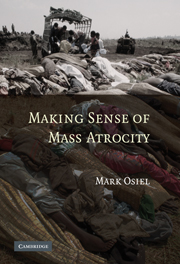Book contents
- Frontmatter
- Contents
- Dedication
- Preface
- Introduction
- 1 The Challenge of Prosecuting Mass Atrocity
- PART I LEGAL RULES AND THEIR PROBLEMS
- 2 The Responsibility of Superiors
- 3 Participating in a Criminal Enterprise
- 4 Defining the Criminal Enterprise
- 5 The Bureaucracy of Murder
- 6 Culpability, Character, and Context in Mass Atrocity
- PART II THE POLITICAL CONTEXT OF LEGAL CHOICE
- PART III NEW POSSIBILITIES AND SOLUTIONS
- Conclusion
- Index
- References
5 - The Bureaucracy of Murder
Published online by Cambridge University Press: 15 September 2009
- Frontmatter
- Contents
- Dedication
- Preface
- Introduction
- 1 The Challenge of Prosecuting Mass Atrocity
- PART I LEGAL RULES AND THEIR PROBLEMS
- 2 The Responsibility of Superiors
- 3 Participating in a Criminal Enterprise
- 4 Defining the Criminal Enterprise
- 5 The Bureaucracy of Murder
- 6 Culpability, Character, and Context in Mass Atrocity
- PART II THE POLITICAL CONTEXT OF LEGAL CHOICE
- PART III NEW POSSIBILITIES AND SOLUTIONS
- Conclusion
- Index
- References
Summary
The key challenges that criminal justice confronts in coping with mass atrocity, as we have seen, trace to a central dilemma: law and evidence permit liability far beyond the few individuals who can practically be prosecuted, but even these few can be convicted only through theories of liability that blame them for wrongs beyond their complete control or contemplation.
This may first appear largely a practical concern about scarce resources: only a few of the big fish can be prosecuted (internationally, at least) for only a small fraction of the misconduct by a limited number of the small fry. Yet this practical problem quickly raises a vexing normative question about how to assess relative degrees of responsibility among an atrocity's myriad participants. Answering that question in turn requires determining what misconduct by which subordinates can be ascribed fairly to specific superiors and their peers. There often will be many such people arrayed along a chain of command, within a general staff, or among the members of an interbranch, policymaking committee. Differing answers to the preceding queries yield distinct choices about whom to prosecute, for which offenses. The scarcity of prosecutorial resources makes these challenges still more fraught with controversy.
Prosecutors at the national and international levels have responded differently to these concerns. At the ICTY, prosecutors turn to enterprise participation because the doctrine readily reaches beyond army bureaucracies to informal power networks, enabling them to maximize convictions – even of lower echelons – and thereby further empowering their emergent professional field of international criminal law.
- Type
- Chapter
- Information
- Making Sense of Mass Atrocity , pp. 91 - 117Publisher: Cambridge University PressPrint publication year: 2009



